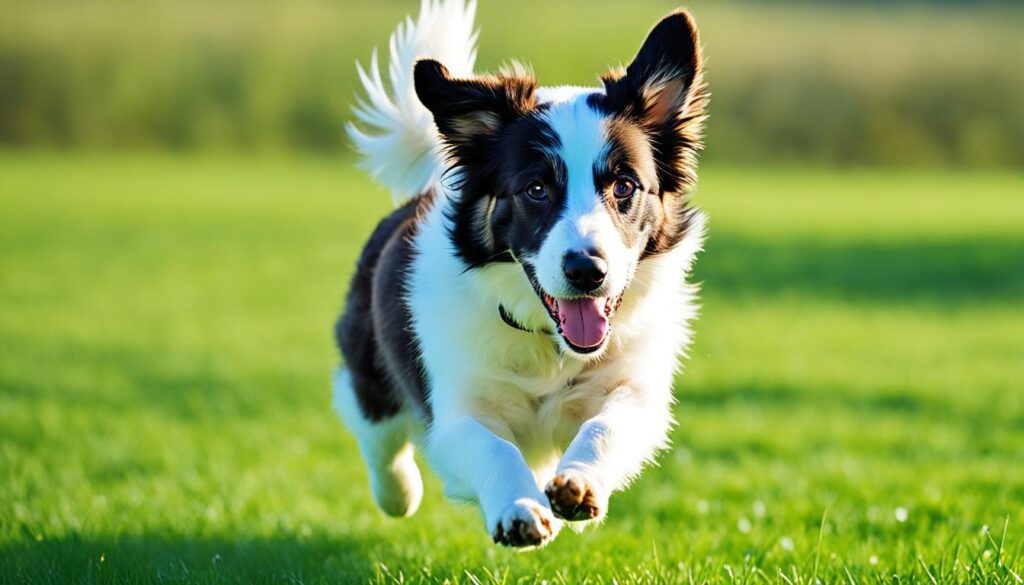Did you know that the Aidi dog, also known as the Moroccan Aidi or Atlas Mountain dog, has been a guardian for families and livestock in North Africa for centuries? This robust breed has a fascinating history and unique characteristics that make it a fascinating companion. In this guide, I will explore the traits, care tips, and interesting facts about the Aidi dog.
Key Takeaways:
- The Aidi dog, also known as the Moroccan Aidi, has a rich history as a guardian in North Africa.
- It is a medium-sized breed with a muscular and sturdy body, known for its intelligence and loyalty.
- Aidis have a thick and weather-resistant coat that requires regular grooming to keep it in good condition.
- Early socialization and consistent training are crucial for Aidis to ensure they are well-behaved and friendly towards strangers.
- Aidis require regular exercise, mental stimulation, and a balanced diet to maintain their overall health and well-being.
Aidi Breed History
The Aidi dog breed has a fascinating history that dates back centuries in North Africa. Native to countries like Morocco, Algeria, and Libya, the Aidi has been an integral part of the local culture and played a vital role in the lives of tribes like the Berber. These dogs were primarily used as guardians, protecting families and livestock from predators such as wildcats and wolves.
Unlike European herding breeds, the Aidi was not bred for herding purposes. Instead, it was specifically developed for its exceptional guarding abilities. Aidi dogs were trusted to keep watch over encampments at night, and during the day, they were allowed to roam freely, providing a constant source of protection.
Even today, the Aidi breed is commonly found in its North African homeland. However, its popularity has expanded beyond its traditional role as a guardian and the Aidi is now increasingly cherished as a beloved house pet around the world.
Discover more about the Aidi dog breed in the following sections:
- Aidi Breed Characteristics
- Aidi Dog Temperament
- Aidi Dog Care
- Aidi Dog Health
- Aidi Dog Training
- Aidi Dog Exercise Requirements
- Aidi Dog Living Conditions
- Conclusion
As we delve deeper into each of these aspects, you’ll gain a comprehensive understanding of what makes the Aidi breed truly special and how to provide them with the care they need.
Aidi Breed History Visualized
| Aspect | Description |
|---|---|
| Origin | North Africa |
| Historical Purpose | Guardian of families and livestock |
| Traditional Role | Protection against wildcats and wolves |
| Cultural Significance | Vital part of Berber tribe life |
| Contemporary Role | Increasingly popular as a house pet |
Aidi Breed Characteristics
The Aidi is a medium-sized dog with a well-proportioned, muscular, and sturdy body. Males are typically 24-26 inches tall at the shoulder and weigh 55-62 pounds, while females are 22-24 inches tall and weigh 44-55 pounds. They have a thick, weather-resistant coat that serves as protection against predators and the elements.
Aidis are known for their loyalty, courage, and devotion to their owners. They have a direct gaze, are highly alert, and are powerful and obedient. This breed requires early socialization and consistent training to ensure they are well-behaved and friendly towards strangers.
| Aidi Dog Characteristics | |
|---|---|
| Average Height (At Shoulder) | Male: 24-26 inches, Female: 22-24 inches |
| Average Weight | Male: 55-62 pounds, Female: 44-55 pounds |
| Coat | Thick, weather-resistant |
| Traits | Loyal, courageous, devoted |
| Personality | Alert, powerful, obedient |
Aidi Dog Temperament
The temperament of the Aidi dog is energetic and alert. Aidis are known to be high-strung and hyper at times, requiring outlets to expend their excess energy. They thrive in rural settings where they have space to run and play, helping to keep them mentally and physically stimulated. However, without adequate exercise and mental engagement, they can become boredom barkers, prone to excessive barking.
The Aidi’s temperament is rooted in its ancient role as a guardian. While they are tolerant and affectionate towards their human families, including children, they are still naturally intimidating and aggressive towards strangers. This behavior stems from their protective instincts and their original purpose as guardians of families and livestock.
Due to their size and more aggressive tendencies, professional training and early socialization are crucial for Aidi dogs. It is essential to teach them proper behavior and obedience to ensure they can interact safely with unfamiliar people and animals.
| Temperament | Description |
|---|---|
| Energetic | The Aidi dog has a high energy level and requires regular exercise to prevent boredom and destructive behaviors. |
| Alert | Aidis are highly alert and have a keen sense of awareness, making them excellent watchdogs. |
| Tolerant | Despite their natural guarding instincts, Aidis are generally tolerant and affectionate towards their human families, making them suitable companions. |
| Intimidating | Aidis can be intimidating towards strangers due to their protective nature and history as guardians. |
| Aggressive | When confronted with a potential threat, Aidis may exhibit aggressive behavior as they prioritize the safety of their loved ones. |
Aidi Dog Care
Proper care is essential to ensure the health and well-being of Aidi dogs. Here are some important aspects to consider:
Exercise Requirements
Aidi dogs have high energy levels and require regular exercise to keep them physically and mentally stimulated. Daily walks and off-leash playtime in a securely fenced area are essential. Engaging them in activities like agility training or obedience training can provide mental stimulation and contribute to their overall well-being.
Grooming and Coat Care
The Aidi’s thick and coarse coat requires regular brushing to prevent matting and shedding. Aim to brush their coat at least once a week to maintain its condition. Regular bathing every 4-6 weeks helps keep them clean and fresh. Additionally, regular ear cleaning is important to prevent infections, as Aidis are prone to ear issues.
Nutrition and Diet
A balanced and nutritious diet is vital for the health and vitality of Aidi dogs. Feed them high-quality dog food that is suitable for their age, size, and activity level. Consult with a veterinarian to determine the appropriate portion sizes and ensure their dietary needs are met.
Veterinary Care
Regular veterinary check-ups are crucial to monitor the overall health of Aidi dogs. Routine vaccinations, parasite control, and dental care should be a part of their healthcare regimen. Early detection and treatment of any health issues can help maintain their well-being and longevity.
To summarize, providing Aidi dogs with regular exercise, proper grooming, a balanced diet, and routine medical care are key for their care and well-being. By meeting these needs, you can ensure that your Aidi companion lives a happy, healthy life.
Aidi Dog Health
Aidi dogs are generally healthy and robust, but it is important for owners to be aware of potential health issues that can affect this breed. By understanding and taking preventive measures, you can help ensure the overall health and well-being of your Aidi companion.
Potential Health Issues
- Hip and elbow dysplasia: Aidi dogs may be prone to hip and elbow dysplasia, which are developmental conditions that can lead to joint problems and lameness.
- Bloat: Also known as gastric dilation-volvulus (GDV), bloat is a life-threatening condition that can occur in deep-chested breeds like the Aidi. It is characterized by the stomach twisting on itself, leading to gas buildup and potentially cutting off blood supply to vital organs.
- Allergies: Aidi dogs can develop allergies to environmental factors such as pollen, dust mites, or certain foods. Allergies can cause symptoms like itching, skin irritation, and gastrointestinal issues.
- Ear infections: Due to their pendulous ears, Aidis are susceptible to ear infections. Regular ear cleaning and proper grooming can help prevent these infections.
In addition to these common health problems, it is essential to monitor your Aidi’s overall well-being and address any other concerns promptly. Regular veterinary check-ups are crucial to detect any potential health issues early on and ensure timely intervention.
Maintaining Aidi Dog Health
While some health issues may be genetic or unavoidable, there are steps you can take as an owner to promote the health and well-being of your Aidi.
First and foremost, providing a balanced and nutritious diet is key. Consult with your veterinarian to ensure you are feeding your Aidi the appropriate food and that their nutritional needs are being met.
Grooming plays a vital role in maintaining Aidi dog health as well. Regular brushing helps keep their dense and weather-resistant coat clean and free of mats. This habit also provides an opportunity to check for any skin abnormalities or parasites. Additionally, keeping your Aidi’s ears clean and dry can help prevent ear infections.
Lastly, a loving and caring environment with plenty of exercise and mental stimulation is essential for your Aidi’s overall well-being. Regular exercise helps keep them physically fit and mentally stimulated. Adequate playtime, socialization, and training contribute to a happy and healthy Aidi dog.
By staying proactive and attentive to your Aidi’s health, you can ensure they live a long and happy life as your loyal companion.

Aidi Dog Training
Training an Aidi dog requires patience, consistency, and positive reinforcement techniques. Aidis are intelligent, loyal, and eager to please, making them highly trainable companions. Early socialization and obedience training are essential for their development and well-being.
Aidis have a fierce intelligence and love having tasks to do. They excel in various tasks such as herding, tracking, and obedience. Their natural instincts and intelligent nature enable them to learn quickly and perform well in training sessions.
However, Aidis also have a stubborn and independent streak, which can make training challenging at times. Establishing yourself as the pack leader and using positive reinforcement techniques, such as rewards and praise, are crucial for motivating and teaching your Aidi.
When training an Aidi, it’s important to focus on building a strong bond with them. Spend quality time together, engage in interactive activities, and provide mental stimulation to keep them engaged and eager to learn.
Training Tips for Aidi Dogs:
- Start training early: Begin socializing and training your Aidi as soon as you bring them home. This will help establish good behavior patterns and prevent any potential behavioral issues.
- Use positive reinforcement: Reward your Aidi with treats, praise, and playtime whenever they exhibit desirable behaviors or successfully complete a training task. Positive reinforcement encourages them to repeat those behaviors in the future.
- Be consistent: Maintain consistent training routines and use the same commands and cues. Aidis respond well to repetition and consistency.
- Provide mental stimulation: Engage your Aidi in brain games, puzzles, and interactive toys to keep their minds sharp and prevent boredom-related behaviors.
- Enroll in obedience classes: Consider enrolling your Aidi in obedience classes to enhance their socialization skills and provide structured training sessions led by professional trainers.
- Be patient and gentle: Aidis thrive in an environment where their training sessions are filled with patience, understanding, and positive reinforcement. Harsh training methods or punishment can be counterproductive and damage the trust between you and your Aidi.
Remember, training is an ongoing process throughout your Aidi’s life. Consistent practice, positive reinforcement, and regular reinforcement of learned behaviors are essential to maintaining their training and behavior. Your effort and dedication in training will result in a well-behaved and obedient Aidi dog.
| Training Tips for Aidi Dogs |
|---|
| Start training early |
| Use positive reinforcement |
| Be consistent |
| Provide mental stimulation |
| Enroll in obedience classes |
| Be patient and gentle |
Aidi Dog Exercise Requirements
Aidis are energetic and active dogs that require a significant amount of daily exercise to maintain their physical and mental well-being. Engaging them in regular physical activity ensures they stay happy, healthy, and well-behaved. Here are some exercise requirements for Aidi dogs:
1. Long Walks or Hikes
Aidis love going on long walks or hikes. It not only provides them with physical exercise but also gives them mental stimulation as they explore their surroundings. Regular walks or hikes help burn off their energy and prevent behavioral issues caused by boredom.
2. Off-Leash Playtime
Allowing Aidis to have off-leash playtime in a securely fenced area is another great way to meet their exercise needs. They enjoy running around freely and engaging in playful activities with their canine companions. It helps them release their excess energy and promotes healthy socialization.
3. Mental Stimulation
In addition to physical exercise, Aidis need mental stimulation to keep their minds sharp. Activities like agility training, obedience training, and puzzle toys can provide them with the mental challenges they crave. These activities also strengthen the bond between the dog and their owner.

4. Variety of Exercise Opportunities
It’s important to provide Aidis with a variety of exercise opportunities to prevent boredom. Varying their exercise routine keeps them engaged and prevents them from becoming complacent. Incorporate activities such as swimming, fetching, and interactive games to keep them physically and mentally stimulated.
5. Consistency
Consistency is key when it comes to exercising Aidis. Regular exercise sessions should be scheduled and maintained to meet their energy requirements. Aim for at least an hour of exercise every day, but remember to consider your dog’s age, health, and individual needs.
| Exercise Requirements | Description |
|---|---|
| Long Walks or Hikes | Aidis need regular long walks or hikes to burn off their energy and satisfy their curiosity. |
| Off-Leash Playtime | Allow Aidis to have off-leash playtime in a secure area, providing them with the freedom to run and play. |
| Mental Stimulation | Engage Aidis in mental activities like agility training and puzzle toys to keep their minds sharp. |
| Variety of Exercise Opportunities | Offer a variety of exercise options such as swimming, fetching, and interactive games to prevent boredom. |
| Consistency | Ensure regular exercise sessions are scheduled and maintained for Aidis to meet their energy requirements. |
Aidi Dog Living Conditions
Aidi dogs are best suited to living in rural or suburban environments where they have ample space to roam and explore. Due to their size, exercise requirements, and natural guarding instincts, they are not well-adapted to apartment living. It is important to provide Aidis with an environment that allows them to live an active lifestyle and fulfill their natural instincts.
Suitable Living Environments
- Rural or suburban areas with large yards or access to open spaces
- Securely fenced properties to prevent wandering
- Access to nature trails or hiking paths
Living with Older Adults or Children
Aidi dogs can thrive in homes with older adults or children, given proper socialization and training. It is important to introduce Aidis to different people and situations from a young age to ensure they are well-socialized and comfortable around unfamiliar individuals.
Socialization and Training
Proper socialization is crucial for Aidis, as they have a tendency to be wary of strangers and protective of their family and territory. Regular visits to dog parks, obedience classes, and neighborhood walks can provide valuable opportunities for socialization and help ensure that Aidis are well-behaved and friendly in various settings.
Image:
Aidi Dog Living Conditions Comparison
| Living Conditions | Suitable | Not Suitable |
|---|---|---|
| Apartment living | No | Yes |
| Rural or suburban areas | Yes | No |
| Large yards | Yes | No |
| Access to open spaces | Yes | No |
| Securely fenced properties | Yes | No |
| Regular socialization | Yes | No |
Conclusion
The Aidi dog breed, also known as the Atlas Mountain dog, is a remarkable companion and guardian. With their loyal, courageous, and devoted nature, Aidis have a long history of protecting families and livestock in the rugged terrain of Morocco and the Atlas Mountains.
These medium-sized dogs possess a strong and muscular build, making them agile and capable of enduring challenging environments. Their intelligence, agility, and endurance make them excel not only as guardians but also as hunters.
To ensure the well-being of an Aidi, regular exercise, proper training, and socialization are essential. These energetic dogs require ample physical activity to channel their energy and prevent any destructive behaviors caused by boredom. Positive reinforcement techniques and early socialization can help shape them into well-behaved and friendly companions.
For experienced dog owners who appreciate their unique qualities and heritage, the Aidi dog can be a loving and rewarding addition to the family. With the right care and attention, this loyal and devoted breed will thrive in an active environment and provide companionship for many years to come.
FAQ
What is the history of the Aidi breed?
What are the characteristics of the Aidi dog?
What is the temperament of the Aidi dog?
How should I care for an Aidi dog?
What are the common health issues of the Aidi breed?
How trainable is an Aidi dog?
How much exercise does an Aidi dog need?
What living conditions are suitable for an Aidi dog?
References
| American Kennel Club (AKC) | https://www.akc.org/dog-breeds/american-foxhound/ |
| United Kennel Club (UKC) | https://www.ukcdogs.com/american-foxhound |
| Canadian Kennel Club (CKC) | https://www.ckc.ca/en |
| Fédération Cynologique Internationale (FCI) | https://www.fci.be/ |








[…] guide has provided valuable insights into the world of Borzois, covering their traits, care tips, and breed […]
[…] Some of these breeds can be more expensive than others, but it’s important to consider the cost of care before adopting any dog. […]
[…] of the 15 most expensive dog breeds has its unique characteristics and traits that make them so special. For […]
[…] the best dog breed for children requires careful consideration of several factors, including size, energy level, temperament, trainability, grooming […]
[…] following these care and grooming tips, you can ensure that your Oriental Shorthair remains healthy, happy, and […]
[…] as German Shepherds and Rottweilers, are commonly used as police dogs, search and rescue dogs, and guide dogs for the blind. This has increased their popularity among those who require specific roles and […]
[…] to prevent them from becoming too long and causing discomfort. Use a nail clipper designed for dogs and be careful not to cut the […]
[…] intelligence can be a positive trait in a dog, it is important to consider the breed’s energy level, temperament, and lifestyle needs […]
[…] Mountain Dogs require regular vaccinations and preventative care, such as flea and tick prevention, to keep them healthy and protected from […]
[…] care is essential to keep your American Eskimo Dog healthy and happy. Meeting their exercise needs and ensuring regular grooming are key aspects of […]
[…] strategies. Whether you choose to focus on quantity or quality, having a clear vision and specific traits in mind will help guide your breeding decisions and maximize profitability. Remember that breeding strategies should align […]
[…] long-bodied dogs? Look no further! In this article, we will provide you with a comprehensive guide to everything you need to know about wiener dogs. From their history and temperament to their health concerns and care needs, we’ve got you […]
[…] dogs include hip dysplasia, ear infections, and obesity. It’s important to provide your dog with regular veterinary care and to maintain a healthy diet and exercise routine to prevent these […]